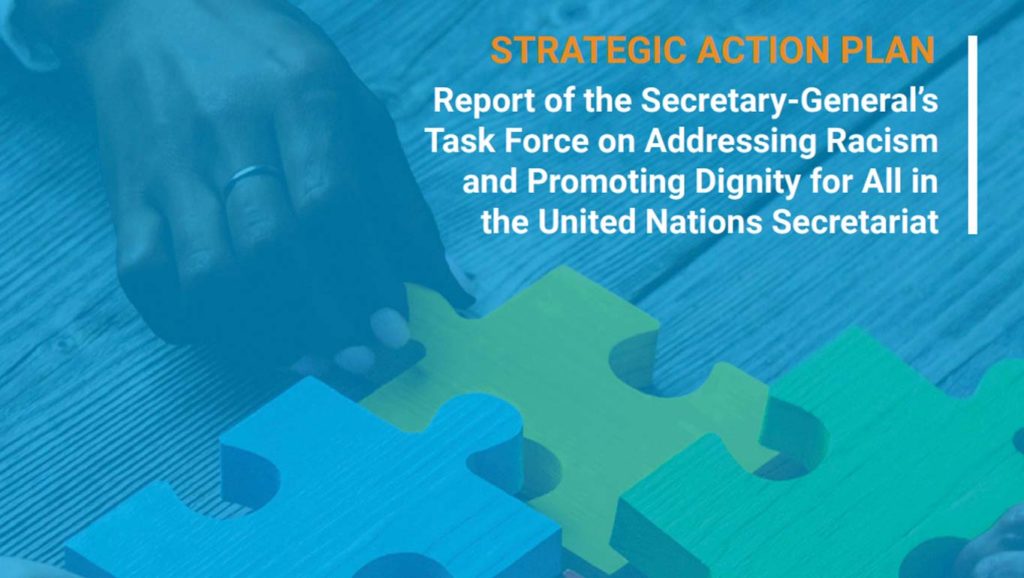The Strategic Action Plan on Addressing Racism and Promoting Dignity for All (SAP) at the United Nations Secretariat, outlines a mission to combat racism within the organization. The Anti-Racism Office oversees, coordinates, and monitors the SAP’s implementation by working closely with a network of Anti-Racism Advocates (ARAs) located across all entities in the global Secretariat. The ARAs serve as crucial extensions of the Anti-Racism Office, acting as drivers of change at the entity level. The Anti-Racism Office provides them with essential skills and resources to empower their efforts towards creating a more racially inclusive and equitable workplace across the UN.
Anti-Racism Advocates, such as Marie Diur, Chair of the UNOG Working Group on Addressing Racism at the workplace, are looking to eradicate racism and racial discrimination from the workplace at UNOG. She says, “UNOG’s agenda on racism and discrimination was in development a long time before the crystallization of initiatives such as the Anti-Racism Team in New York.”
Marie Diur explains her position as a platform “to say things as they are and to make sure that everybody feels safe to talk about racism and racial discrimination.” Marie Diur has been supported by the UNOG Working Group, which is essential help given the limited time commitment of 2-3 days a month allocated to ARAs. She remarks that unfortunately, “all hours of the day need to be dedicated to show it is really being taken seriously.”
The current 180 ARAs across 127 entities have been nominated to support the implementation of the SAP at their entity level through concrete actions to counteract racial discrimination and contribute to a more just and inclusive UN.
Another ARA, Xiaohai Shi, is the Chief of Operations and Resource Management at the United Nations Interim Force in Lebanon (UNIFIL). He was appointed as an ARA by UNIFIL Head of Mission/Force Commander (HoM/FC). He outlines his reasons for joining the anti-racist force: “to actively and visibly model, champion, sponsor and advance anti-racist and inclusive behavior and create an enabling work environment to implement the Strategic Action Plan.”
The momentum generated by the launch of the SAP has also highlighted that addressing racism and racial discrimination at the United Nations will take time and will entail an approach that educates and equips the ARAs with the tools to identify and combat racism. Xiaohai Shi explains that the “Anti-Racism Team can from time to time refocus the attention of entities’ top leadership on anti-racism, which, in turn, empowers and motivates Anti-Racism Advocates to do more and keep up their efforts. In that sense, periodic visits and review meetings with entity leadership by the Anti-Racism Team can be really helpful.”

Sandhya Peerthum is an ARA and Senior Management Programme Officer at the United Nations Joint Staff Pension Fund (UNJSPF). She is in charge of culture transformation within the Office of Investment Management (OIM) and then became an ARA for OIM to foster inclusion and a culture of acceptance in the organization. The ARAs work also involves raising awareness, advocating for policy changes, and fostering dialogue to promote understanding and equality in the workplace, which calls for an approach that will provide a supportive environment that encourages openness and actively values diversity. This approach will proactively review, create, and reinforce policies, practices, and attitudes that will deliver equity and dignity to all UN personnel.
The ARAs network will contribute both to the effective implementation of the SAP into their entities’ work programs, and to advance the UN’s commitment to the cause. Xiaohai Shi states that the “anti-racism agenda has a lot to do with promoting diversity and transparent recruitment process, as well as frequent interactions with different categories of mission personnel,” which he aims to have a part in to remove “the long and complicated history intertwined with many aspects of social fabric such as history, culture, attitude, education.”
Successful anti-racism activities and policies have the potential to be scaled up outside the UN Secretariat and shared universally as good practices – making the UN a role model whose values are reflected through the well-being of its staff and the effective delivery of its mandates. Investing in these activities will certainly contribute to addressing racism and racial discrimination beyond the UN system.
In 2023, the Anti-Racism Office conducted the first Anti-Racism Advocacy Training for its ARAs where 76 ARAs received their training completion certificates. Sandhya Peerthum describes the anti-racism training as “a good starting point. But, given the complexity and scope of racism, more comprehensive training and guidance is needed to be effective advocates.”
Another group of 150 participants, comprising of ARAs, members of implementing departments and other affinity groups within the UN System is currently engaged in the Anti-Racism skill training also offered by the Anti-Racism Office.
The task ahead for the ARAs extends far beyond just raising awareness. Sandhya Peerthum insists: “We need to delve deeper into our organization’s processes and scrutinize them with a critical eye. This encompasses every aspect of our operations, from recruitment to onboarding, from daily interactions to promotion decisions.
The impact of our work will be measured by how we influence the way we operate to make the office a more equitable place; how we educate staff about race related issues and how we promote a more inclusive and diverse workplace.”



